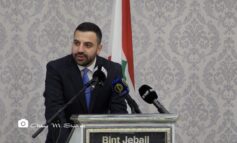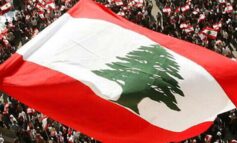
BEIRUT (IPS) – The lush Bekaa Valley is nestled between snowy Mount Lebanon and the Syrian border. The region, reputed for its wine production, was this week the witness to a violent crime in the Christian city of Zahleh, where two members of the anti-Syrian Kataeb party (Phalangists) were gunned down.
In the courtyard of Zahleh’s Catholic diocese on Tuesday, Apr. 21, it seemed a white wedding was taking place. White bouquets bloomed along the ancient stone walls, while people standing by window panes threw rice on the crowds below. Music floated in the air, and huge crowds crammed by the large church, singing Kataeb party anthems.
The illusion of a happy celebration vanished, however, upon the appearance of two coffins at the bottom of the hill, carried by the crowd amid tight security.
Since the 2005 killing of former prime minister Rafik Hariri, Lebanon’s ruling anti-Syrian majority — comprised of the Christian Kataeb party and Lebanese Forces (LF) as well as the Druze Progressive Socialist Party (PSP) and the Sunni Future Movement — has been hit by a series of bombings and assassination attempts against their deputies, ministers, journalists and party members. The murders of Selim Assi and Nasri Marouni add to an already long and morbid list of casualties.
The two victims were gunned down last Sunday at about 4 p.m. allegedly by Joseph Zouki, who is accused of staging a shootout targeting the newly inaugurated Kataeb headquarters at Hawsh al-Zaraaneh in Zahleh.
“Zouki was driving though the neighborhood since the morning; he was stopped by the police at a road block during the time of the inauguration. But, as soon as the army and interior forces left, he moved towards the Kataeb headquarters and started shooting,” said eyewitness Brahim Dagher.
Investigators at the crime scene found 26 bullet casings from a Kalashnikov and another type of handgun. The suspect’s car, a Jaguar, which was later found abandoned, was hit by a single bullet. The suspect is believed to have fled with his brother, Tohmi, who allegedly also played a role in the attack.
According to Zahleh inhabitants interviewed by IPS, Zouki, who was imprisoned on several charges, was a close ally of MP and former minister Elias Skaff, a member of the opposition. Skaff and Gen. Michel Aoun, head of the Free Patriotic Movement, a leading Christian party and opposition member, both claim the killing is an isolated incident.
On the day of the funerals, political flags of the Future, Kataeb and LF majority movements floated high in the air. Young men and a few women clad in black proudly waved their banners, as former president Amine Gemayel — father of MP Pierre Gemayel, who was shot to death in his car two years ago — passionately promised justice for the crime.
“We may not know who killed Pierre, but we know who committed the Zahleh crime. It will not go unpunished!” Gemayel said, visibly shaken. From beneath the staircase leading to the first floor, where Gemayel was giving his speech, the crowd repeatedly chanted: “Pierre lives in us, Pierre lives in us.”
In a radio interview the same day, Gemayel accused Skaff of possessing “advance knowledge” of the Zahleh shooting. He urged Skaff not to involve himself in a battle that was much bigger than him, and to stop playing with fire. “We (the Kataeb party) behave with a sense of responsibility, but our duty is also to protect ourselves and our families. I ask you to hand in the criminals without any further delay.” A massive manhunt for the two suspected killers is currently underway throughout the Bekaa.
Oussama Stambouli, a Zahleh resident, expressed shock at the killing. “This is the first time such a crime takes place in our city. We’re all Christians in Zahleh; we are like one family and know each other very well. We may disagree with each other, but this should not lead to a killing,” he said, adding that he was not satisfied by the stance of Skaff or Aoun on the issue.
“There is a plot against us — someone intends to create a rift among Christians, and it seems like he’s succeeding,” added Samir Ahwach, another bystander.
Meanwhile, in Zahleh’s empty streets, a church bell resonates in the valley. A woman wearing black leans against the church wall crying, silent tears running down her cheeks. Lebanon once again mourns its dead.





Leave a Reply